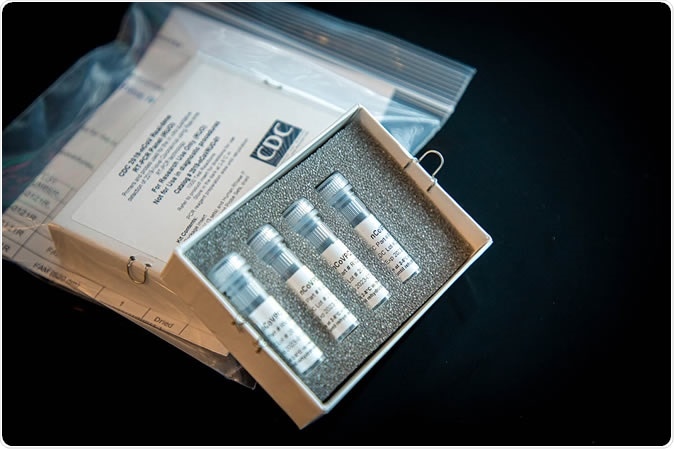In the light of the ongoing novel coronavirus epidemic in China, the US Food and Drug Administration has granted approval of a diagnostic test for use in emergency situations (emergency use authorization or EUA). The viral infection has spread to many different and distant parts of the world, involving over 25,000 people and causing nearly 600 deaths since it started in December 2019.
The diagnostic test is called the 2019-nCoV Real-Time RT-PCR diagnostic panel. It was developed by the Centers for Disease Control and Prevention (CDC), and involves the use of reverse transcriptase-polymerase chain reaction (RT-PCR).

This is a picture of CDC’s laboratory test kit for the 2019 novel coronavirus (2019-nCoV). CDC is shipping the test kits to laboratories CDC has designated as qualified, including U.S. state and local public health laboratories, Department of Defense (DOD) laboratories and select international laboratories. The test kits are bolstering global laboratory capacity for detecting 2019-nCov.
The RT-PCR test uses nasal secretions or oral swabs to get viral material. The RNA is then copied (transcribed) in the reverse direction to get a complimentary copy of the virus genome in the form of DNA, using the enzyme reverse transcriptase. The complementary DNA is then amplified, that is, multiple copies of the DNA are made using traditional PCR.
If the test is positive, it is likely that the person has a novel 2019 coronavirus (2019-nCoV) infection.
However, if the test is negative, there is still a chance that the person might be infected. The test is most accurate when used along with clinical observations, the history of the patient and other disease-related risk factors.
The Approval
This test has been restricted to use only in CDC laboratories until now, which means all samples had to be shipped to the CDC laboratories. The shipping time in addition to the 4-6 hours required to run the test added to the time required for diagnosis.
Now, however, the test can be run by any laboratory that is qualified to CDC standards, including all state laboratories.
The fast-track approval was made possible by avoiding the usual regulatory channel. Instead, the FDA made use of an EUA which means that if there are no alternatives to the test and the situation is one which poses a risk to life, the test can be approved without fulfilling all the usual mandatory conditions. The EUA was also used for diagnostic tests for Zika virus, Ebola and MERS virus.
Stephen Hahn, the FDA commissioner, stated: “Since this outbreak first emerged, we’ve been working closely with our partners across the US government and around the globe to expedite the development and availability of critical medical products to help end this outbreak as quickly as possible. The ability to distribute this diagnostic test to qualified labs is a critical step forward in protecting public health.”
The US Situation
About 260 people have been tested for the 2019-nCoV, with 11 positives. Nonetheless, the US has already declared the situation to be a public health emergency despite the low threat of coronavirus infection in that country. The ostensible reason is the long period between getting infected and displaying the first symptoms, which gives ample time to spread the infection to others without ever knowing it.
However, the impact of the 2019-nCoV epidemic is still markedly less than that of the seasonal influenza sweeping the US, with over 10 million cases and over 10,000 deaths so far, despite the availability of a vaccine.
The symptoms of infection with 2019-nCoV are, like those of influenza, mainly headache, fever and a running nose, with body pain. In a small subset the patient develops acute respiratory distress.
Health authorities are strongly recommending that any person diagnosed with the infection get in touch with their doctors to control their symptoms and to prevent spread to other people as well.
Conclusion
CDC’s Nancy Messonnier says the EUA will make the US much more capable of testing people suspected of infection. The CDC, she says, has already sent the test to the International Reagent Resource, which is the hub for diagnostic tests, ahead of approval. This ensures that it can be used as soon as the EUA comes through.
The FDA is also working with other research agencies to speed up the development and approval of more diagnostic tests that can accelerate diagnosis, and also on bringing out new treatments and possibly preventive measures.